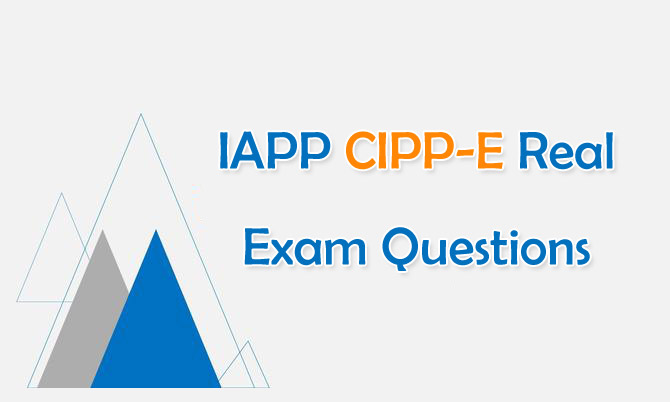The latest IAPP CIPP-E real exam questions are available, which are helpful for you to study the test. Achieving a CIPP/E credential shows you have the comprehensive GDPR knowledge, perspective and understanding to ensure compliance and data protection success in Europe—and to take advantage of the career opportunity this sweeping legislation represents. To prepare IAPP CIPP-E exam well, the related CIPP-E exam information, topics and real exam questions are helpful in the preparation.
There are 90 questions in real Certified Information Privacy Professional/Europe (CIPP/E) exam, and there are 75 scored questions. You have 2.5 hours to complete the test. The exam price is $550, and the retake fee is $375. The IAPP’s CIPP/E is accredited by the American National Standards Institute (ANSI) under the International Organization for Standardization (ISO) standard 17024:2012. Certificants must pay a certification maintenance fee (CMF) of $250 that will cover the certification two-year term. This fee is required every two years upon recertification.
Certified Information Privacy Professional/Europe (CIPP/E) CIPP-E exam topics cover the following sections.
The new cracked IAPP CIPP-E real exam questions can help you test the above topics. Share some Certified Information Privacy Professional/Europe (CIPP/E) CIPP-E real exam questions below.
1.What is the MAIN reason GDPR Article 4(22) establishes the concept of the “concerned supervisory authority”?
A. To encourage the consistency of local data processing activity.
B. To give corporations a choice about who their supervisory authority will be.
C. To ensure the GDPR covers controllers that do not have an establishment in the EU but have a representative in a member state.
D. To ensure that the interests of individuals residing outside the lead authority’s jurisdiction are represented.
Answer: A
2.Which area of privacy is a lead supervisory authority’s (LSA) MAIN concern?
A. Data subject rights
B. Data access disputes
C. Cross-border processing
D. Special categories of data
Answer: C
3.If a multi-national company wanted to conduct background checks on all current and potential employees, including those based in Europe, what key provision would the company have to follow?
A. Background checks on employees could be performed only under prior notice to all employees.
B. Background checks are only authorized with prior notice and express consent from all employees including those based in Europe.
C. Background checks on European employees will stem from data protection and employment law, which can vary between member states.
D. Background checks may not be allowed on European employees, but the company can create lists based on its legitimate interests, identifying individuals who are ineligible for employment.
Answer: C
4.Why is advisable to avoid consent as a legal basis for an employer to process employee data?
A. Employee data can only be processed if there is an approval from the data protection officer.
B. Consent may not be valid if the employee feels compelled to provide it.
C. An employer might have difficulty obtaining consent from every employee.
D. Data protection laws do not apply to processing of employee data.
Answer: A
5.What is true if an employee makes an access request to his employer for any personal data held about him?
A. The employer can automatically decline the request if it contains personal data about a third person.
B. The employer can decline the request if the information is only held electronically.
C. The employer must supply all the information held about the employee.
D. The employer must supply any information held about an employee unless an exemption applies.
Answer: D
